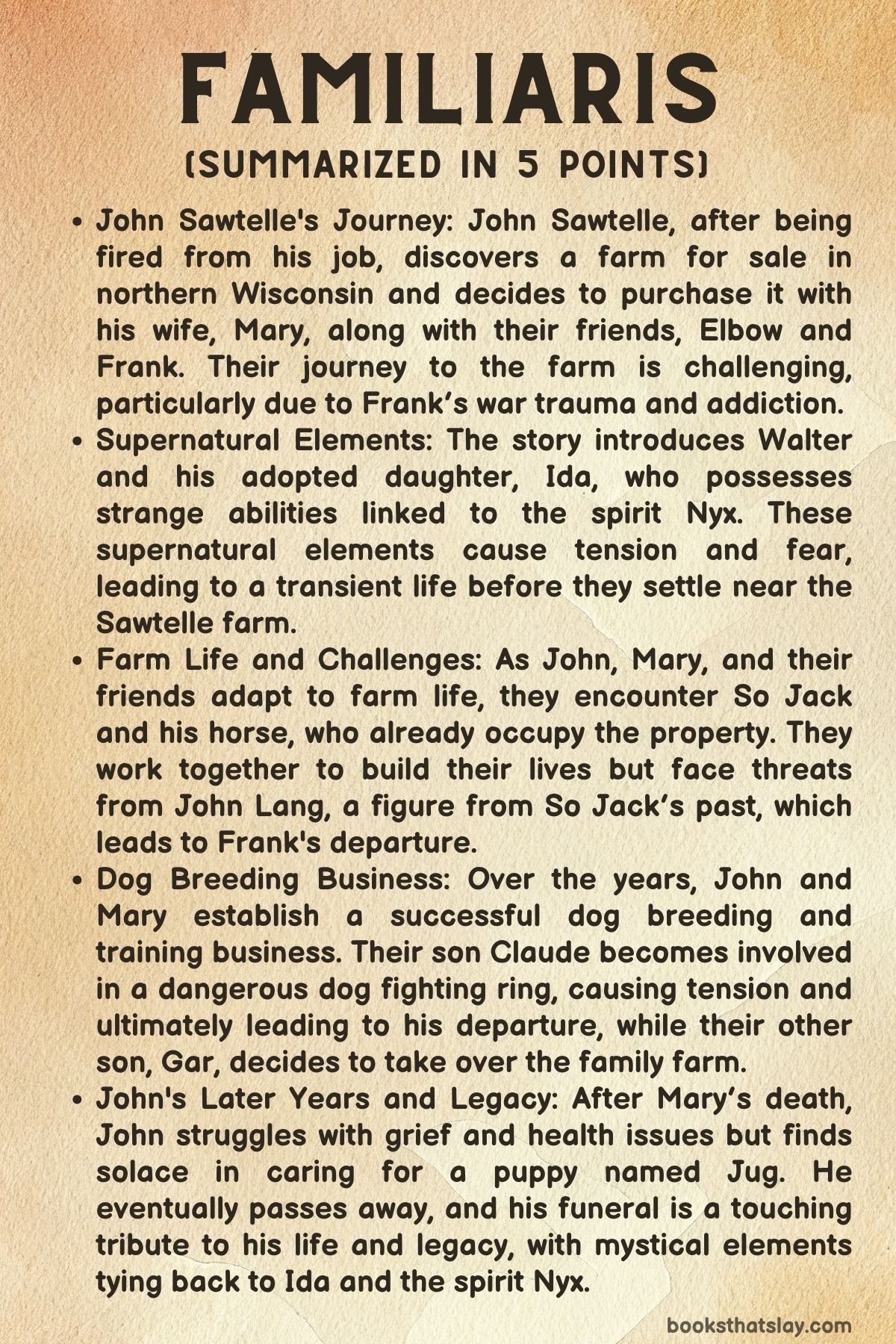Familiaris Summary, Characters and Themes
Familiaris, the much-anticipated prequel to David Wroblewski’s The Story of Edgar Sawtelle, delves deep into the origins of the Sawtelle family.
Set against the backdrop of early 20th-century America during World War I and Prohibition, the novel explores the complex relationships and events that shape the family’s legacy. Through the eyes of John Sawtelle, we witness the birth of his dog breeding and training business, a venture that will define the Sawtelle lineage for generations.
Summary
Familiaris begins with John Sawtelle, who, after a sudden car breakdown, discovers a farm for sale in northern Wisconsin. John works at the Kissel factory, where his innovative ideas are dismissed, leading to his firing. On the same day, he thwarts an assassination attempt on the factory’s owner, Louis Kissel, who offers him a permanent job out of gratitude.
However, John declines the offer and instead purchases the farm with his wife, Mary, inviting their friends Elbow and Frank to join them. The journey to the farm is fraught with difficulties, especially as Frank struggles with trauma from the war and his battles with addiction.
When they finally arrive, they find an unexpected occupant already living in the farmhouse.
The story then shifts to Walter and Ida Paine, owners of a nearby shop called Popcorn Corners. Walter reveals that he found his daughter, Ida, as a baby after escaping a wildfire.
He rescued her while aboard a search and rescue boat bound for Peshtigo. Ida, however, is no ordinary child; she possesses strange abilities tied to the spirit Nyx, which have forced them to live on the move for years.
Settling in Popcorn Corners provides temporary respite, but her powers continue to attract unwanted attention, culminating in a lightning strike that kills a criminal who tried to rob their shop.
As John, Mary, Elbow, and Frank settle into their new lives on the farm, they encounter So Jack and his horse, Granddaddy, who have been squatting on the property.
Together, they repair the farmhouse and establish routines, with So Jack introducing a unique form of therapy that helps Frank cope with his issues. However, tensions rise when John Lang, a dangerous man from So Jack’s past, threatens their peace.
Frank ultimately deals with the threat, leading to his departure alongside So Jack and Elbow. John, left to reflect on their achievements, dedicates himself fully to his burgeoning dog breeding and training business.
Over the next 27 years, John and Mary build their lives around their dogs and their children, Gar and Claude.
However, trouble brews when Claude becomes involved in a dog fighting ring under the influence of Ev Minch. This leads to a series of dangerous events, culminating in Mary, with Ida’s supernatural help, rescuing their dog, Forte, from Ev. Claude eventually leaves, setting off on a troubled path of his own, while Gar expresses his desire to take over the family farm.
As Mary and John grow older, they sell the farm to Gar and embark on a journey to visit the dogs they have bred, but their plans are interrupted by tragedy when Mary dies in a car accident.
In the final part of the novel, John, now a widower, struggles with grief and health issues. He moves into an apartment and forms a bond with a puppy named Jug. Despite setbacks, including an eviction, John finds solace in caring for Jug, with help from his old friend Frank.
John’s life comes to a poignant end, and his funeral is a moving tribute, with dogs in attendance and a coffin crafted from voicewood by Elbow.
The story concludes with a mystical transformation as Ida becomes Nyx, her howl resonating with the Sawtelle dogs around the world.

Characters
John Sawtelle
John Sawtelle is the central character in Familiaris, whose journey from a factory worker to a successful dog breeder and trainer forms the core of the narrative. His character is marked by a profound sense of determination and resilience, which is evident from his decision to purchase the farm and build a new life despite his abrupt dismissal from the Kissel factory.
John’s moral integrity is also highlighted when he saves Louis Kissel’s life but declines the job offer, choosing instead to forge his own path. His interactions with those around him—such as his wife Mary, friends like Elbow and Frank, and the enigmatic So Jack—reveal a man deeply committed to his loved ones but also someone who is introspective and aware of the complexities of human relationships.
Over the years, John’s dedication to his dog breeding business showcases his innovative spirit and his belief in the idea that “there is no misbehavior, only behavior,” a principle that guides his training methods. As he grows older, John’s character grapples with loss and existential doubts, particularly after Mary’s death, which pushes him to the brink of despair.
His final years, marked by a mixture of grief, nostalgia, and a quiet resolve, encapsulate a life lived with purpose, even as he struggles to find meaning in the face of mortality.
Mary Sawtelle
Mary Sawtelle is portrayed as a steadfast and supportive partner to John, deeply involved in the establishment and growth of their farm and dog breeding business. Her character is a blend of practicality and nurturing, providing emotional and logistical support to John as they navigate the challenges of rural life.
Mary’s role expands beyond that of a wife and mother; she is also a mediator and protector, particularly in her interactions with Ida and the supernatural elements that come to influence their lives. Her retrieval of Forte from the dangerous Ev Minch underscores her bravery and resourcefulness.
Mary’s death in a car accident is a pivotal moment in the novel, leaving a profound impact on John and marking the beginning of his downward spiral into grief and introspection. Even after her death, Mary’s presence lingers in the narrative, particularly through John’s letters to her, which reflect his deep love and enduring connection to her.
Frank
Frank is a complex character who struggles with the emotional and psychological aftermath of World War I. His journey through the novel is marked by intense internal conflict, manifested in his addiction and his difficulty in adjusting to life after the war.
Frank’s relationship with John and the others on the farm is both supportive and strained, as he oscillates between moments of camaraderie and episodes of isolation due to his trauma. His involvement with So Jack’s “sentimental counseling” and the subsequent healing process illustrates his vulnerability and desire for redemption.
Frank’s decisive action against John Lang, a figure from So Jack’s past, shows a moment of empowerment and a break from his passive suffering. By the end of the novel, Frank’s purchase of the apartment building where John lives indicates a reversal of roles, where Frank becomes a protector and provider, a stark contrast to his earlier dependence.
So Jack
So Jack is an enigmatic and pivotal character who brings a sense of mystery and wisdom to the farm. He arrives with a stolen horse named Granddaddy, and his background is only partially revealed, adding to his mystique.
So Jack’s introduction of “sentimental counseling” using Granddaddy as a medium for emotional healing reflects his deep understanding of both human and animal nature. His past, particularly the threat posed by John Lang, hints at a life marked by danger and moral ambiguity.
Despite his rough edges, So Jack becomes an integral part of the farm’s community, offering guidance and support, particularly to Frank. His eventual departure with Frank and Elbow suggests a character who is constantly on the move, perhaps unable to settle due to the unresolved aspects of his past.
Ida Paine
Ida Paine is a character intertwined with the supernatural elements of the novel, serving as a bridge between the human and spirit worlds. Raised by Walter Paine after he finds her as a baby during a wildfire, Ida possesses unusual abilities linked to the spirit Nyx.
Her powers create both wonder and fear, particularly in the community around Popcorn Corners. Ida’s character embodies themes of otherness and the burden of hidden power, as she and Walter move frequently to avoid attention.
Her connection to the Sawtelle family deepens as the novel progresses, particularly through her intervention in the conflict with Ev Minch, where she helps Mary retrieve Forte. The novel’s conclusion, where Ida transforms into Nyx and howls at John’s funeral, symbolizes the enduring and mystical connection she has with the Sawtelle lineage and their dogs.
Walter Paine
Walter Paine, Ida’s adoptive father, is a figure of stability and quiet strength. His backstory, fleeing a wildfire and finding Ida, adds a layer of tragedy and heroism to his character.
Walter’s decision to raise Ida, despite her strange nature, speaks to his compassion and sense of responsibility. He operates Popcorn Corners with a sense of diligence, trying to maintain a semblance of normalcy in the face of Ida’s growing powers.
Walter’s relationship with John Sawtelle is marked by mutual respect and an understanding of the burdens they both carry. As a guardian of Ida, Walter represents the theme of protection, both from external threats and the internal struggles that come with raising a child with supernatural abilities.
Elbow
Elbow is another key figure in John’s life, providing friendship and support throughout the novel. His character is marked by a sense of loyalty and practicality, helping John with the challenges of farm life.
Elbow’s role becomes more significant towards the end of the novel, particularly in his involvement with voicewood, a mystical element introduced late in the narrative. His journey to New Zealand to extract voicewood and the subsequent gift of a coffin made from this wood for John’s burial underscores his deep bond with John and his understanding of the spiritual aspects of their lives.
Elbow’s actions highlight themes of friendship, loyalty, and the blending of the mystical with the everyday.
Claude Sawtelle
Claude is the darker, more troubled counterpart to his brother Gar. His involvement in a dog fighting ring and his manipulation by Ev Minch highlight his moral ambiguity and susceptibility to external influences.
Claude’s actions, particularly in deceiving Gar about the fate of their dog Forte, illustrate a character driven by insecurity and a desire for approval, even at the cost of his family’s trust. His eventual departure from the family farm and his drift into a life of crime and manipulation reflect a lost soul, unable to find his place within the Sawtelle family’s legacy.
Claude’s enlistment in the Navy as a medic represents a possible attempt at redemption, but his character remains one of unresolved tension and moral complexity.
Gar Sawtelle
Gar, in contrast to Claude, embodies the qualities of responsibility and continuity. His decision to take over the family farm after John and Mary’s departure shows his commitment to the family legacy.
Gar’s character is less developed in terms of internal conflict, serving more as a stabilizing force within the family. His success with the farm alongside his wife Trudy represents the fulfillment of John’s vision and the continuation of the Sawtelle lineage.
Gar’s interactions with Claude, particularly as he learns of Claude’s betrayal, reveal a man deeply affected by his brother’s actions but ultimately focused on preserving the integrity of the family and their work.
Ev Minch
Ev Minch serves as the primary antagonist in the novel, embodying the corrupting influence that leads Claude astray. His involvement in dog fighting and his manipulation of Claude illustrate a character driven by greed and cruelty.
Ev’s conflict with the Sawtelle family, particularly with Mary’s retrieval of Forte, underscores the broader theme of good versus evil that runs through the novel. His eventual defeat, facilitated by the supernatural intervention of Ida, represents the triumph of the Sawtelle family’s values over the darker forces in their world.
Themes
The Interconnection of Ancestral Legacy and Supernatural Forces in Shaping Identity
Familiaris delves deeply into the intricate relationship between the Sawtelle family’s ancestral legacy and the supernatural forces that underpin their lives. The novel suggests that identity is not merely a product of familial ties or personal experience but is intricately woven with otherworldly elements that transcend generations.
John Sawtelle’s life and decisions are shaped not only by the values and traditions passed down from his forebears but also by the mystical presence of Nyx, as seen in Ida’s connection to the spirit world.
This fusion of legacy and the supernatural frames the Sawtelle family as not just a lineage but as a continuation of a larger, mystical narrative that influences their identity, actions, and ultimately their fate.
The supernatural, particularly through Ida’s abilities, serves as both a blessing and a curse, complicating the family’s pursuit of normalcy and highlighting the theme that identity is as much a spiritual inheritance as it is a familial one.
The Psychological Impact of Trauma and the Quest for Redemption
The narrative intricately explores the psychological ramifications of trauma, particularly through the character of Frank, whose experiences in World War I leave him grappling with intense emotional scars and addiction.
His journey, which mirrors a broader post-war disillusionment, is marked by a profound quest for redemption—a theme that resonates throughout the novel as various characters seek to atone for past misdeeds or cope with their burdens.
The farm becomes a sanctuary for these traumatized souls, offering them a space to heal. Yet, the persistence of their inner demons, particularly Frank’s, underscores the enduring nature of trauma.
The theme of redemption is further complicated by the presence of supernatural elements, where traditional paths to forgiveness and self-acceptance are disrupted by forces beyond human understanding, such as the spirit of Nyx.
Thus, the novel portrays redemption not just as a personal journey but as one that is inextricably linked to the otherworldly, suggesting that true healing requires reconciliation with both internal and external, even supernatural, forces.
The Dichotomy of Control and Freedom in the Human-Animal Relationship
Central to Familiaris is the exploration of the complex dynamics of control and freedom within the human-animal relationship, particularly through the Sawtelle family’s dog breeding and training business.
John’s philosophy that there is no misbehavior, only behavior, reflects a deep understanding of the nuanced balance between control and autonomy in both human and animal behavior.
The novel interrogates this dichotomy, questioning the ethical implications of imposing human will on animals while also recognizing the necessity of such control for coexistence. The dogs in the novel are not mere pets or tools but are depicted as sentient beings with their own desires and instincts, which often clash with the humans’ attempts to impose order.
This theme is further complicated by the supernatural elements in the story, where the boundaries between control and freedom are blurred, as seen in Ida’s supernatural influence over events and individuals.
The novel thus presents the human-animal relationship as a microcosm of larger existential questions about autonomy, dominance, and the struggle to find harmony between the two.
The Collision of Progress and Tradition in Early 20th Century America
Set against the backdrop of World War I and Prohibition, Familiaris vividly portrays the tension between progress and tradition during a time of great social and technological upheaval in America. John Sawtelle’s initial work as a vehicle tester at the Kissel factory symbolizes the era’s push towards industrialization and innovation.
However, his subsequent dismissal and decision to retreat to a rural farm life represent a deliberate rejection of this progress in favor of a more traditional, agrarian lifestyle.
The novel explores how this tension impacts the characters’ lives, as they navigate a world where old values are constantly being challenged by new realities.
The farm itself becomes a battleground for these opposing forces, where the simplicity and stability of traditional rural life are threatened by the encroachment of modernity, represented by characters like John Lang and the dangers of the outside world.
The novel suggests that the collision of progress and tradition is not merely a historical phenomenon but a continuous struggle, with the characters’ fates being shaped by how they respond to these competing forces.
The Spiritual Significance of Space and the Concept of Sacred Geography
The setting of Familiaris is imbued with a profound spiritual significance, where places are not merely physical locations but are endowed with sacred and mystical qualities that influence the characters’ destinies. The farm, for instance, is more than just a home for the Sawtelle family; it is a sacred space where the boundaries between the physical and spiritual worlds blur.
This concept of sacred geography is reinforced by the recurring motif of the voicewood, a mystical substance connected to Ida and the spirit Nyx, which symbolizes the intertwining of the natural world with the supernatural.
The narrative suggests that certain spaces hold a spiritual power that can either protect or endanger those who inhabit them, depending on how they engage with these forces.
The idea of sacred geography extends to the broader landscape of northern Wisconsin, where the natural environment is portrayed as a living entity with its own will and consciousness.
Through this lens, the novel explores how human actions are influenced by the spiritual dimensions of the spaces they occupy, and how these spaces, in turn, shape their spiritual journeys.


